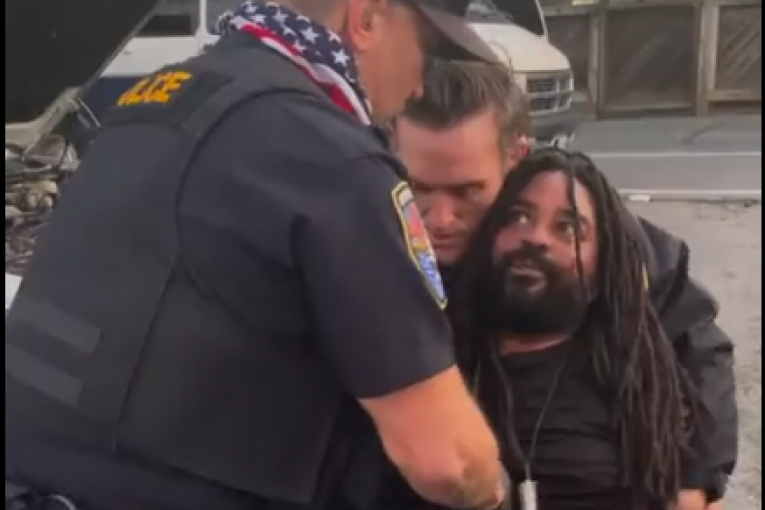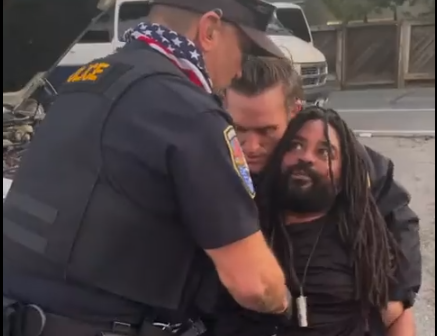

By Rory Fleming
Jeremy Portje, a young Black photojournalist, was attempting to film footage at a homeless encampment when Sausalito police officers confronted him. They ended up throwing him to the ground and arresting him, while bystanders filmed them. Portje appears to submit throughout a seven-minute video posted to YouTube.
The cops, who are white, claimed Portje hit an officer in the face with his camera. They kept his equipment. Later, when asking Judge Mark Talamantes for a search warrant, they claimed he is “known to be actively anti-police” and “not a true objective journalist.”
Both the police department and the elected District Attorney, Lori Frugoli, claimed his equipment was not searched, but they lied. A memo sent from investigator Brett Liddicoet to DA Frugoli proved it. After local news put this on blast, the DA dropped the case.
As a threshold matter, if Portje is some insurgent radical, he is the most subtle one I’ve ever seen. He photographs dudes who love birds. He hangs out with veterans. He trains dogs to save people in crisis.
As another one, Frugoli is one of those very special DAs who went to law school not to be a lawyer, but to be a prosecutor. In high school, she was a police cadet. Then she became an officer with the Santa Rosa Police Department. A night student, she put herself through law school by working at the Marin County Sheriff’s Office.
Her first law job? Deputy prosecutor in the Marin County DA’s Office.
Any claim that she has a prosecutor’s necessary level of separation between herself and local police agencies must be viewed through this lens. This case should have been honestly investigated by the DA; an honest investigation would have meant no reason to charge Portje with a crime in the first place.
But the fact that a candidate like Frugoli could win the 2018 DA race over a progressive, Anna Pletcher, in one of most liberal counties in the nation, says something about a significant swath of California Democrats. They support abortion, they support LGBTQ+ rights, and they’re almost as conservative on criminal justice as Texans.
It is also rather convenient that Marin County is less than 3 percent Black, and Black people are most disproportionately hammered by the criminal justice system.
On top of that, a recent study from UC Berkeley found that the county is highly segregated by race. Stephen Menendian, the lead researcher on the study, said of the Bay Area, “Marin is substantially the most segregated county in the nine-county area. You have a sea of white. There is basically nothing that is integrated in the entire county.”
Most white Marin County liberals probably don’t know — really know — a Black person. They know about the concerns and desires of Black people from social media and movies.
That makes it easier to accept discrimination against people like Portje. In fact, local reporting essentially censored his racial identity. I had to comb through his social media and video footage of the incident to find out.
As for a solution, I think back to Bernie Sanders’ 2020 presidential campaign slogan, “fight for that person you don’t even know.” Maybe some people care how many Black friends a person has, like it’s a contest. I don’t.
What I do care about is that what happened to Portje is wrong, and that there is little chance locals will take stock of what really happened here.
To be able to call oneself a liberal, a basic litmus test should be whether you are willing to fight for someone you don’t know. If you aren’t, then what will distinguish you once the abortion and LGBTQ+ rights fights are finally settled?
Rory is a writer and licensed attorney.

Then the writer goes on to say this:
Ah, but it sounds like you do.
I watched the 7 minute video, all it showed was Portje sort of resisting arrest by not letting the officers cuff him. The video doesn’t show what happened before Portje was cuffed or what caused the officers to arrest him. The officers claimed that Portje hit one of them with his camera and one officer did need medical attention after the incident.
Here’s part of an article I found about Jeremy Portje and the incident:
They always make those kinds of claims, but the charges are being dropped. Police said ” Portje struck an officer in the face with his camera, contradicting witnesses quoted by the weekly Pacific Sun, who said an officer accidentally hit himself with the camera and then punched Portje while other officers handcuffed him.”
Moreover, his stuff was seized by police – camera, cell phone and memory cards – and they claimed that the items were not searched and will be returned unexamined – except a memo from the DA’s investigator shows that’s a lie as well.
Yeah, claims are always made by both sides in any altercation. So are we supposed to believe the homeless encampment witnesses or the officers? As the article stated:
Unless some more video of the incident comes forward who knows what happened for sure, but there are two sides to every story which doesn’t always get told on the Vanguard.
In this case, the police provably lied about searching the phone, and the charges were dropped leading me to believe that the police were lying. Moreover police do not get to decide who is or is not a legitimate journalism, and journalists who embed themselves with protesters or others often become swept up in what happens.
You are allowed your ‘opinion‘.
The problem is often the supposed journalists are not the press at all, just another protester hiding under the guise of being the press.
That said, I don’t feel that’s the case here.
Honestly, they don’t even like (other) “white” people, in Marin. 🙂
But at least it feels pretty safe, for anyone really. (Unless you set-out to look for trouble.)
Otherwise known as, “we’re all journalists”.
There was also a bunch of “journalists” at the capitol building, about a year ago.
I don’t believe it was mentioned in the article that Jeremy Portje is or at least was the vice chair of the Novato Police Advisory & Review Board.
Actually, those “concerns and desires” usually emanate from other white people, speaking on “behalf of” black people.
In other words, “whitesplaining” from one group of white people to another group of white people. If I had to guess, I’d suggest that the author himself might be falling into this definition.
As if any “group” is homogenous in the first place.